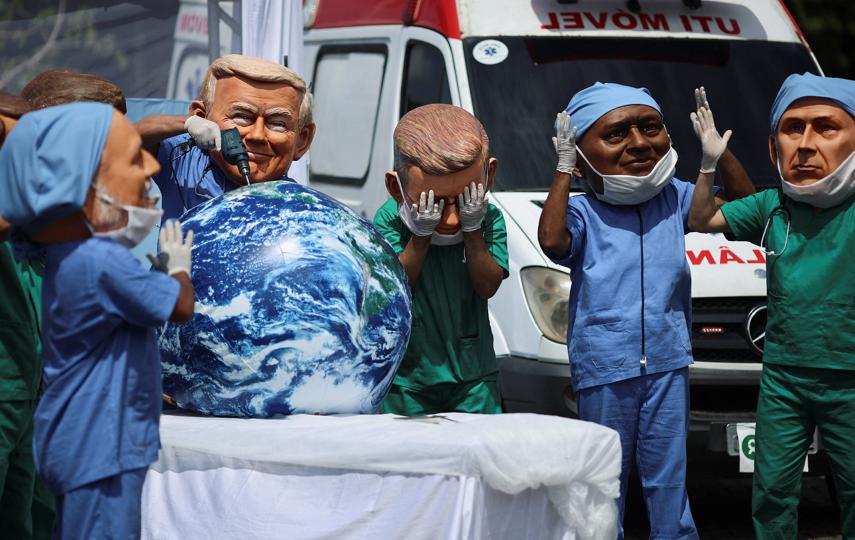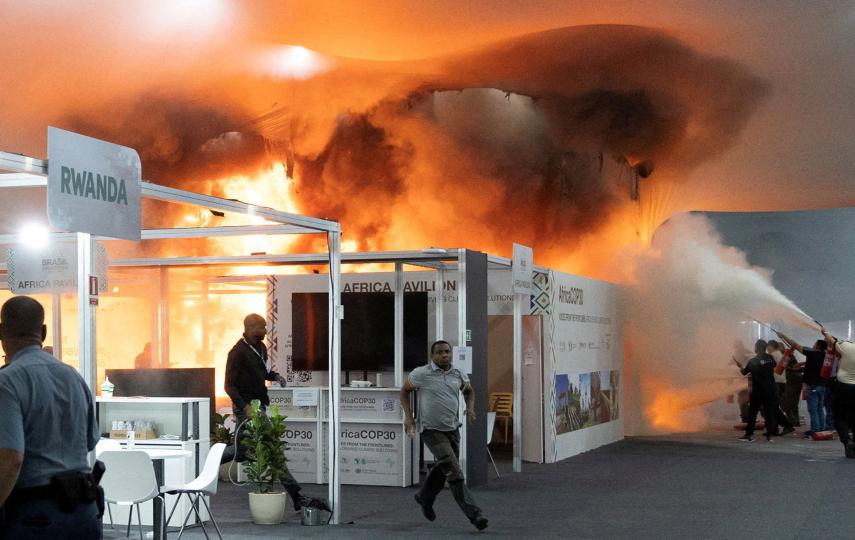Covering the UN climate change talks is, in many ways, a surreal experience. This year’s talks - the 18th Conference of the Parties (COP) to the UN Framework Convention on Climate Change (UNFCCC) - were held in Doha’s futuristic Qatar National Convention Centre. The front of the centre is propped up by structures shaped like huge tree trunks, and the inside is bathed in an eerie blue and green light, with a giant spider guarding the main foyer. The fact that you are always deprived of sleep during the marathon talks lends to the sense of otherworldliness.
But the sense of disconnectedness really sinks in when rushing from a press event featuring a squabble over the inclusion or exclusion of certain phrases in texts under negotiation to another by residents of small islands making an emotional appeal to save their people from imminent destruction.
It is not unusual for negotiators from countries steeped in the destructive realities of climate change to suddenly breakdown at the irrationality of it all - as Naderev Sano, chief negotiator from Philippines, did this year. His country is currently grappling with the aftermath of deadly Typhoon Bopha.
Climatologist Jeff Masters says Bopha is the third category 5 typhoon to hit the Western Pacific this year, and the strongest typhoon to slam the Philippine island of Mindanao, which “rarely sees strong typhoons due to its position close to the equator”. He explains, “Tropical cyclones rarely form so close to the equator because they cannot leverage the earth's rotation to get themselves spinning.”
Ultimately the talks are a heady cocktail of questions around survival, existence, science, nationalism, equity, class, faith, trust and big money
We cannot really tell if climate change had anything to do with Bopha’s unusual path of destruction, but many scientists believe global warming is increasing the frequency and severity of extreme events. During his appeal, a clearly overwhelmed Sano turned to the other negotiators to ask if they would be able to look their children in the eye and say they had done their best to avert catastrophe. Sano had raised similar emotional questions during the climate talks in Durban last year.
It recalled a moment in 2009, during the talks in Copenhagen - regarded as the worst COP - when Lumumba Di-Aping, lead negotiator of the G77 and China, broke down and said they had been asked to sign a suicide pact. He asked what President Barrack Obama would say to his daughters. And during the very first UN climate talks I covered, in Bali in 2007, I stumbled onto two representatives from Bangladesh crying on the steps outside the conference centre. They were distraught that they were unable to keep up with counterarguments from developed countries’ impressive legal armoury.
I spend most of every year covering attempts by poor countries to deal with extreme climate events like the droughts. I, too, find it difficult to reconcile a world in which poor countries are unable to adapt to climate change with the COPs’ barter of words and ideologies.
This year’s was no different from previous talks. But the debates were heightened as 2012 signals the end of the first commitment phase of the Kyoto Protocol, and of the 2007 long-term cooperative agreement (LCA) on providing support, in the form of finance and technology, to developing countries to help them reduce their emissions and adapt.
The LCA had been an effort to draw the US - which has not signed the Kyoto Protocol - into the process. The US had maintained that China and India, now also major emitters of greenhouse gas, should take on mandatory emission-cutting targets like the rest of the developed world. China and India, on the other hand, argued that they could not afford to curb industrial growth to reduce emissions. Under the LCA, China, India and rest of the developing world agreed to take on voluntary emission cuts. The US joined on to that agreement - but it is ending this year. And a number of LCA issues remained unresolved, particularly the matter of providing finance and technological support to developing countries. Such support has been inconsistent and inadequate, obliterating any sense of trust between the poor and rich countries. Many of these unresolved issues have been deferred to next year’s talks in Poland.
The US has indicated that it will only be party to a legal agreement to cut emissions when China, India and the rest of the developing world agree to take on mandatory targets to reduce emissions; such a deal would only come into effect in 2020. And even this decision only came about after the European Union (EU) allegedly used strong-arm tactics to split the developing world, forcing the least developed countries to put pressure on China and India to take on mandatory cuts.
But a point largely overlooked is that even though the EU, as a bloc, has achieved its emission cut targets for the first phase of the Kyoto Protocol, the cuts are still lower than the action scientists say is necessary to prevent the world from warming by beyond two degrees Celsius by the end of the century.
This year, developed countries signalled that they would rather wait for the Intergovernmental Panel on Climate Change’s next assessment, due to be released in 2013-2014, to determine the kind of cuts they should take on in a new deal - but rumours at the conference alleged that they are trying to influence the kinds of data considered in the assessment. It is also not uncommon to come across allegations that poor countries are being threatened with revocation of bilateral aid to push them toward conceding their positions.
This year’s talks did have one particular highlight: The issue of loss and damage caused by climate change emerged as a key concept, one resisted by the developed world, which fears it could open doors to lawsuits demanding they pay compensation. At one point, a frustrated Edna Molewa, South Africa’s Minister of Water and Environmental Affairs, who had been tasked with brokering a deal on loss and damage, turned to me and grimly joked, “Can you go and talk to the US and the Europeans for me, please?” Yet the developing countries won some ground in the end. Loss and damage survived as a major issue, which could make way for the development of a mechanism to determine whether money and support are required for poor countries suffering the effects of climate change.
Ultimately the talks are a heady cocktail of questions around survival, existence, science, nationalism, equity, class, faith, trust and big money. Battle lines are drawn along those issues - and there are moments when you marvel that none of it will mean anything if we cannot ensure the continuation of life on our planet.
jk/rz
This article was produced by IRIN News while it was part of the United Nations Office for the Coordination of Humanitarian Affairs. Please send queries on copyright or liability to the UN. For more information: https://shop.un.org/rights-permissions




